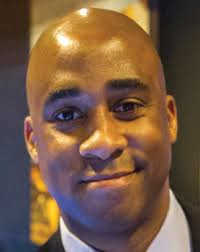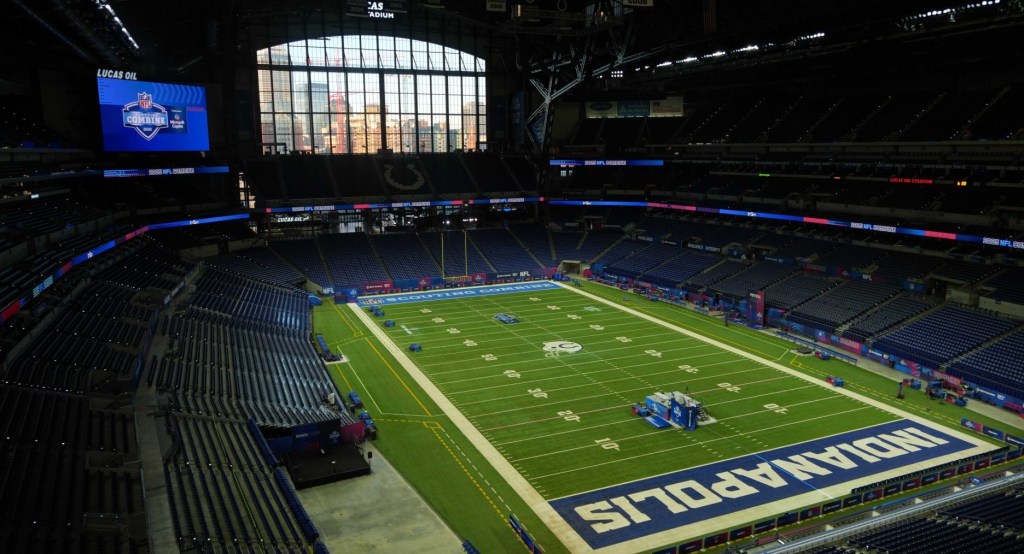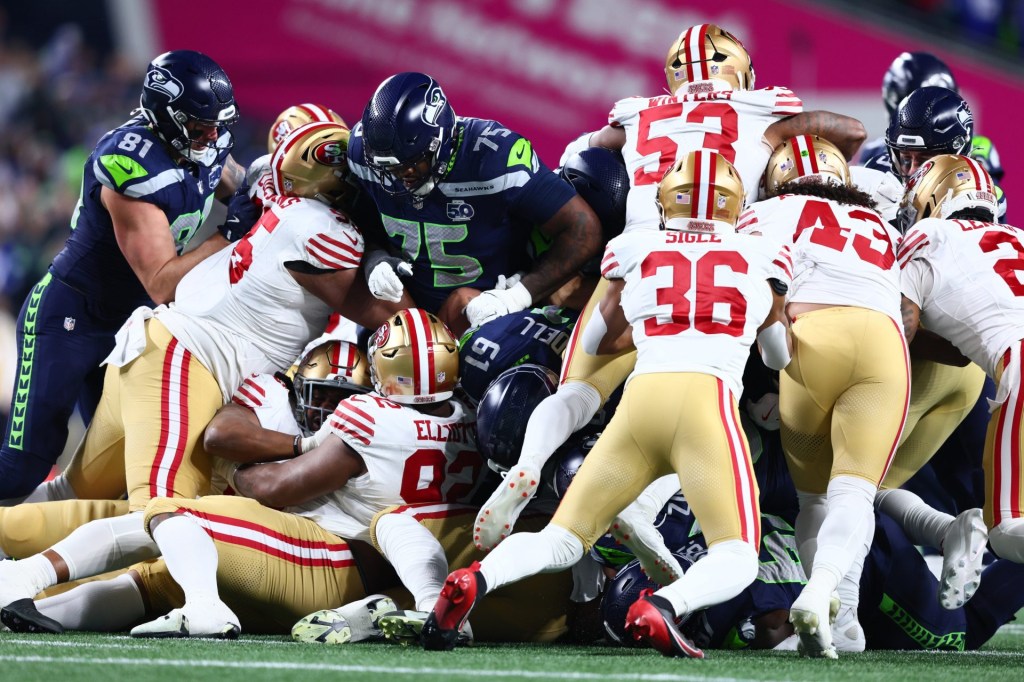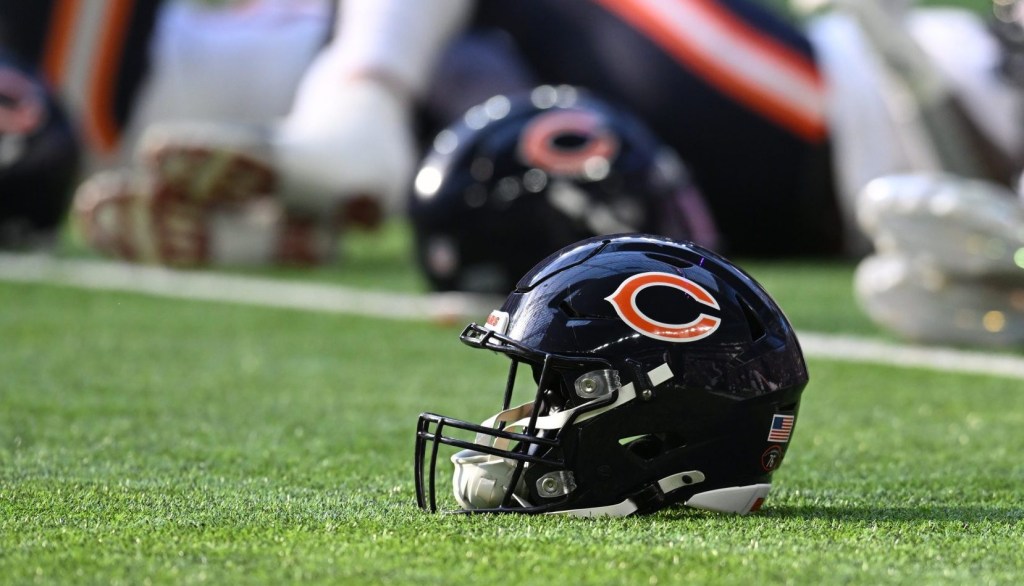This interview is presented to you by the University of Nebraska — Lincoln Master of Arts in Business with a Specialization in Intercollegiate Athletics Administration
By: A. Frank Arredondo, @fdotdondo

Front Office Sports was honored to have interviewed Mr. Damani Leech, Vice President for Football Strategy and Business Development at the National Football League (NFL). Leech is a native of Tacoma, Washington who graduated from Princeton University and served as a football student-athlete. Leech is a seasoned professional in sports business, having worked at organizations such as the Professional Golfers’ Association (PGA) and the National Collegiate Athletic Association (NCAA). Leech is excited to face a new challenge and opportunity with his role at the NFL.
While at Princeton, Leech began his sports business journey on a whim, after having spoken to a classmate about a work-study opportunity in the athletic department. Like many of his Princeton classmates, he dabbled in the investment banking field for a few summers, but noticed he did not enjoy the work and found himself counting down the hours of his workday. Leech noted this work study opportunity was only a couple of days out of the week, stuffing envelopes, clipping actual articles of interest from newspapers/magazines (prior to the internet) and sending out mailings. However, Leech described this opportunity as a “moment of discovery,” where he came to the realization that there were careers in the sports field outside of coaching, playing and officiating.
Leech took advantage of this opportunity by seeking out daily interactions and exchanges with individuals such as Gary Walters, former longtime Princeton Athletic Director, former Ivy League commissioner Jeff Orleans, and other staff members. Leech decided to write his senior thesis at Princeton on the Olympic Drug Testing Program, which gave him tremendous insight and background into sports and policy.
With this momentum, Leech landed a four-month internship with the PGA after graduation. Leech shared that this experience, although brief, allowed him to become familiar with the business of sport, the culture and the kinds of things one might deal with in the industry.
Once this internship was complete, Leech transitioned to the NCAA as part of their prestigious postgraduate internship program in the area of regulatory compliance. This internship turned into a full-time job in the area of Membership Services, and after four years, Leech transitioned to the area of Championships.
By the time Leech departed the NCAA, he had served with the Association for 17 years and oversaw several championship events including football, baseball, volleyball, hockey, tennis as well as playing rules and officiating.
About a year ago, Leech had an opportunity to transition away from the NCAA and move onto the NFL in a new role that is focused on strategy and business development. Leech explained that this new opportunity with the NFL allows him to have a deep dive into a sport that he loves, while stretching some new muscles as well.
“The biggest difference is the depth of work I get to do at the NFL. With the NCAA, we ran 90 championships for 24 sports for thousands of student-athletes. Whereas, with the NFL, it is one sport and 32 clubs and there are hundreds of people working on behalf of those 32 clubs.”
Having spent close to 20 years in the sports business industry, Leech was able to share a variety of insights into navigating this ever-changing landscape, especially for individuals getting their start or first job.
“I think what people are looking for at the entry-level are two things. They are looking for people who are going to be able to get work done and be productive and people they are going to get along with.”
Leech added hiring managers and leaders will ask themselves, “©an they (new hire candidate) do the job, and am I going to be able to be around them for eight hours a day.”
Leech shared that the biggest difference in the sports business market today from when he first started is technology.
“There is a significant generational gap in the area of technology. If you are a younger student/employee, take advantage of that.”
Leech added that football has continued to devote resources into the area of technology and analytics.
“We see it on the fan-facing side, but we are starting to see it more on the football side with analytics. As football clubs are getting deeper and deeper in their involvement in analytics, they are looking for people who are familiar with that and can translate that data into something useable from a coaching and scouting standpoint.”
Leech said technology is a tool with which new employees can help show their ability to solve problems.
“Organizations are looking for solutions. You can be someone who has an idea and the ability to develop it. Organizations are looking for ways to continue to compete and get better.”
As a leader and manager of people, Leech gave his take on what separates a good employee from a great employee at any organization.
“A great employee is the one who is trying to better themselves and improve the organization. As a manager, you just don’t want someone to punch a clock everyday. Great employees are coming to you with ideas on how to improve things.”
“Implementation is a really critical and sometimes underestimated aspect of one’s success. We often focus on the creation of the idea, but coming up with the implementation plan for the idea is the hardest part.”
— Damani Leech
As a fan of the movie, “Back to the Future,” I asked Leech that if time travel were possible, what advice might he give an eager sports business professional back during his day. His response might surprise you.
“I probably would have recommended I seek a Masters in Business Administration (MBA).”
Executive and flexible MBA programs were not as readily available at the time and Leech, most likely, would have been forced to make a decision on full-time employment versus being a full-time student. Leech described today’s sports business world as placing a greater premium on an understanding of the business aspects of sports. Leech has aimed to compensate for this by being an avid reader and listener of business people and ideas, however, he wishes he had a more formal training via undergrad or graduate school.
Leech also recommended that with an ever-increasing workload and responsibility, a work-life balance becomes even more important and vital to one’s success.
“You have to set rules for yourself. You can’t follow those 100 percent of the time, but you need to have an idea of when you will leave the office and when you will return emails while at home.”
Leech noted that he encourages his staff to block days off ahead of time and make personal and family time a priority. Leech added, “Work-life balance is the buzz word, but it is really about defining happiness and adhering to it.”
Leech was gracious enough to give some insight into some rapid fire questions that I deemed “Frank’s Five for Five” for this interview.
Five things that Leech maintains on his desk that allows him to be more effective in his role: Two monitors for double the viewing space, two cell phones (one for documents and one for emails), three magazines including Sports Business Journal, Harvard Business Review, and Fast Company Magazine.
Four people that have inspired Leech to be a better professional: Mom, dad, wife and children
Three books that have impacted Leech’s growth personally and professionally: Barack Obama’s “Audacity of Hope”, “Steve Jobs” biography by Walter Isaacson, and “Good to Great” by Jim Collins.
Two tools that are needed to be successful in the area of sports business: Firm understanding of social media/technology in all aspects of the business of sports and strategic networking skills
One last thought by Leech for our Front Office Sports Audience:
“Implementation is a really critical and sometimes underestimated aspect of one’s success. We often focus on the creation of the idea, but coming up with the implementation plan for the idea is the hardest part.”
Leech described that managing implementation well and quickly overcoming obstacles along the way is really difficult. Leech made it a point to remind us that seeing things through implementation is a valued skill, especially for those up and coming sports business professionals.
We would like to thank Leech for his time and insight for our Front Office Sports followers. We wish him the best in his new endeavor with the NFL.
Leech is happy to connect with Front Office Sports followers and share more about his story and career path.
You can follow him on Twitter and connect with him on LinkedIn.

This interview was presented to you by the University of Nebraska — Lincoln Master of Arts in Business with a Specialization in Intercollegiate Athletics Administration





![[Subscription Customers Only] Jul 13, 2025; East Rutherford, New Jersey, USA; Chelsea FC midfielder Cole Palmer (10) celebrates winning the final of the 2025 FIFA Club World Cup at MetLife Stadium](https://frontofficesports.com/wp-content/uploads/2026/02/USATSI_26636703-scaled-e1770932227605.jpg?quality=100&w=1024)










